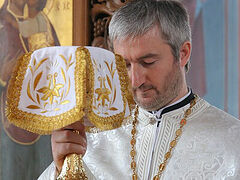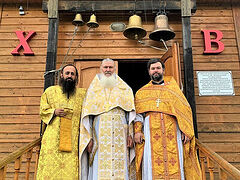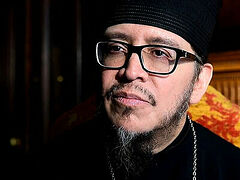 Priest Evgeny Shmelev with his family Priest Evgeny Shmelev, a clergyman of the Church of the Dormition of the Mother of God in Singapore, tells our readers an amazing story about how he as a graduate of Bauman Moscow State Technical University, an engineer and a programmer, came to Singapore to get a second higher education and eventually became a priest of the Russian Orthodox Church, baptized his father, and now he, his wife and their seven children combine household chores, church services, and life in one of the world’s fastest growing cities.
Priest Evgeny Shmelev with his family Priest Evgeny Shmelev, a clergyman of the Church of the Dormition of the Mother of God in Singapore, tells our readers an amazing story about how he as a graduate of Bauman Moscow State Technical University, an engineer and a programmer, came to Singapore to get a second higher education and eventually became a priest of the Russian Orthodox Church, baptized his father, and now he, his wife and their seven children combine household chores, church services, and life in one of the world’s fastest growing cities.
It’s early morning, and still dark outside. The father of a large family wakes up the older children and helps them get ready for school. On the way to work he takes his youngest daughter to kindergarten. The scene in the office is familiar: the muffled hum of co-workers’ conversation, many people, and open space... The day passes, and again at six in the evening the working day is over. You may argue that it’s nothing special—an ordinary day for an ordinary person. But our hero is not ordinary. He gets into the car and drives to an Orthodox church to celebrate the evening service.
Integrating into Church life in Singapore
If there is an early Liturgy at seven in the morning in the service times, then before work I drive to church to serve. In the evening my family and I spend time helping our children with homework or talking, and at ten o’clock everyone goes to bed. Everything is just as in a typical family. In the evening hours I continue my studies in pastoral courses. The Lord arranged everything in my life in the best way. But my wife and I had walked a long path to this way of life.
I was baptized at twenty-five when I started dating my future wife. Her grandmother was a very religious person. She told us: “That’s not good! You must get baptized.” I heeded her advice and was baptized.
After the wedding we decided to organize an unusual honeymoon trip for ourselves. Some of the money had been saved up, some was borrowed. The travel agency advised us to visit Malaysia and Singapore. So we learned about the existence of Singapore.
On arrival in Kuala Lumpur we felt as if we were in a sauna—it was extremely humid and unusually hot. Many locals try not to walk outdoors during the day. It’s the same all over Asia. There are actually no seasons here, but there is a rainy season from December till January. Sometimes there are heavy rains, and during this period it becomes cooler, but it is always very humid
 Priest Evgeny Shmelev with his wife Anna
Priest Evgeny Shmelev with his wife Anna
We had our eldest son baptized in a Moscow church. We thought that it would be good to raise him in the Orthodox tradition. We visited the church after our son’s Baptism. But it so happened that the priest did not allow me to take Communion. He asked me: “Did you fast? Did you read the prayer rule? If not, sorry—you may not approach the chalice.” After that I no longer had the courage to go to church for some time. There were many parishioners, and it was unclear to me what to do and what to read, and the work of my integration into Church life did not move forward.
Our move to Singapore
At some point I started thinking about a second higher education. I looked for a university and Singapore turned up as an option. By Divine Providence, I was easily admitted to the University of Singapore. I learned English on my own in order to study abroad, and when the moment of language practice came, the first thing that surprised me was the so-called “Singlish”—Singapore Colloquial English. While speaking English, locals can use the grammar of Chinese, plus some interjections and connecting words from Malay. It took me a long time to get used to it.
 Metropolitan Sergius (Chashin) of Singapore and Southeast Asia I moved first, and then my wife. We tried to get a job and succeeded. She and I were about thirty at the time. We missed communicating with our compatriots. And then my spouse found information about the parish of the Dormition of the Theotokos online—at that time it was relatively close to us. Singapore is not a very big city—it’s approximately twenty-five by fifteen miles. You can drive around it in a couple of hours. It took us about fifteen minutes to travel to the church by bus. And so we began to attend church regularly on Sundays. It can be said that my life in the Church began when I moved to Singapore.
Metropolitan Sergius (Chashin) of Singapore and Southeast Asia I moved first, and then my wife. We tried to get a job and succeeded. She and I were about thirty at the time. We missed communicating with our compatriots. And then my spouse found information about the parish of the Dormition of the Theotokos online—at that time it was relatively close to us. Singapore is not a very big city—it’s approximately twenty-five by fifteen miles. You can drive around it in a couple of hours. It took us about fifteen minutes to travel to the church by bus. And so we began to attend church regularly on Sundays. It can be said that my life in the Church began when I moved to Singapore.
For the first three years, the priests were constantly changing in our parish. Every three months Vladyka Sergius [Metropolitan of Singapore and Southeast Asia.—Ed.] sent priests from Russia to visit us. Sometimes he would send us someone for the second time, but these priests were mostly unknown to us. In 2009, we got a permanent priest when a parishioner of our church, Alexander, was ordained [now Bishop Pitirim (Dondenko) of Jakarta, Vicar of the Diocese of Singapore.—Ed.].
The future Vladyka Pitirim performed obediences in the choir when my wife and I began to attend the parish. We have a long-standing tradition of staying for tea or a meal after services and talking. That’s when we first met him. It was then that Bishop Sergius suggested that I help in the altar.
“What am I doing here?!”
For about five years I was an ordinary parishioner, serving as an acolyte and helping in any way I could. But one day after the service Vladyka Sergius invited me into the altar and asked me if I had considered the priestly ministry… I was astonished as I had never thought about it. After that conversation I started pondering and looking back at the events that had happened to me over the years.
“What am I doing here? How did I get here?” I suddenly found God’s Providence in everything that had happened to me, and in his offer I saw my calling. I hoped that I would serve as a deacon for a while because I was afraid to immediately become a priest. But a year and a half later I was ordained a priest. My wife supported me—we have complete mutual understanding in this matter.
First services
I remember my first Vigil when I said the litanies. One of the parishioners came up to me and said, “How well you’ve read them! I understood everything, but earlier I didn’t understand anything.” I was so worried that I think these words were said to me as a consolation. Initially, I had to learn how to pronounce the litanies in Church Slavonic, and then we began to serve in English. I remember how I prepared, replaying the services continuously in my head. I listened to the recording of the Liturgy while driving, rehearsing, as it were. I was ordained deacon in Singapore.
I was ordained priest at the Church of the Holy Trinity in Ostankino in Moscow on the eve of the feast of Pentecost in 2016. I remember how many parishioners gathered for confession, and immediately after my ordination I was blessed to hear confessions.
I concelebrated at my first services as a priest. But when I served the first Liturgy on my own, of course I was very worried. It was an early Liturgy, and Priest Alexander Churochkin (who serves in the Church of the Holy Trinity in Ostankino) advised me not to worry if I did not have time to finish reading the prayers, and said that if something unexpected happened, he would finish them for me. This care was very important to me. And everything went well, thank God!
I still keep alive the memories from my first service, as if it were yesterday. It was a step I had to take, getting over my fear and indecision. Hearing confessions for the first time was scary, going into the altar was scary too. Now I understand that it was not anxiety, but awe.
I believe that we found the way to the Church through the prayers of my wife’s grandmother. My mother was baptized years ago, and my father was baptized at the age of sixty-five not long ago. At one time, our whole family would add a prayer to the evening rule in which we asked the Lord in our own words that “grandfather decide to get baptized”. The Lord arranged everything in an amazing way: I myself performed the sacrament of Baptism when he visited us in Singapore four years ago.
The Dormition Parish in Singapore
Services are held regularly here. Gradually the number of parishioners grew. Initially, the church was far from the center and it was not convenient for everyone to travel ther—first by metro, and then by bus. And later, when the parish moved to Highland Road, it became much more convenient to get there—now it takes five minutes to walk from the metro to the church. It is more spacious here, and there is an area around the house. We have a house church.
The composition of our parish often changes because some come to Singapore to work temporarily—for one or two years or for five years. Most of our parishioners are Russian-speaking, but there are also locals: Chinese and Indians. Among them are whole families in which one member brought another to the Church; there are former Catholics and Protestants who were dissatisfied with something in the theology of their religion and in search of truth they came to us. Others invite their friends, others come because they found information about us somewhere.
There was the following story. We received a young man, a former Catholic. He is Singaporean and his girlfriend is Russian. He wanted to get baptized in Russia, but could not find anyone who could speak to him in English about faith. He did not know the Russian language, and therefore he did not succeed in embracing Orthodoxy. On arriving home, he found our church, talked with the clergy, and we baptized him.
“Why have you come to get baptized?”
We have this established order: The first priest with whom a person came into contact prepares him for Baptism. If someone calls me, I decide with him when to meet, talk, and appoint the date of Baptism. But if they call Vladyka Pitirim, then he himself talks with them and performs the sacrament of Baptism.
Most talks are held with godparents, because most often it is children being baptized. We don’t try to give people the whole catechism in two meetings. It is important for me that after a conversation or Baptism a person himself decides to come to Communion. I invite people to think about the most important thing: “Why have you come to get baptized?”
I try to make it clear that this person has an ongoing relationship with God, whether he realizes it or not. And if God participates in his life, then he needs to somehow establish this contact with God. How can you not think about the purpose of life? If at least once you think seriously about the fact that life is eternal, that there is no death, and the main goal is the salvation of your soul, the question arises: “What should we do to attain salvation?”
This is where people begin to think about what to insert into this logical chain. And if we try to honestly answer the question of whether we can attain salvation on our own, the answer will be obvious. Outside help, participation in the sacraments established by the Lord, and sincere trust in His holy will are as necessary for us as breath.









